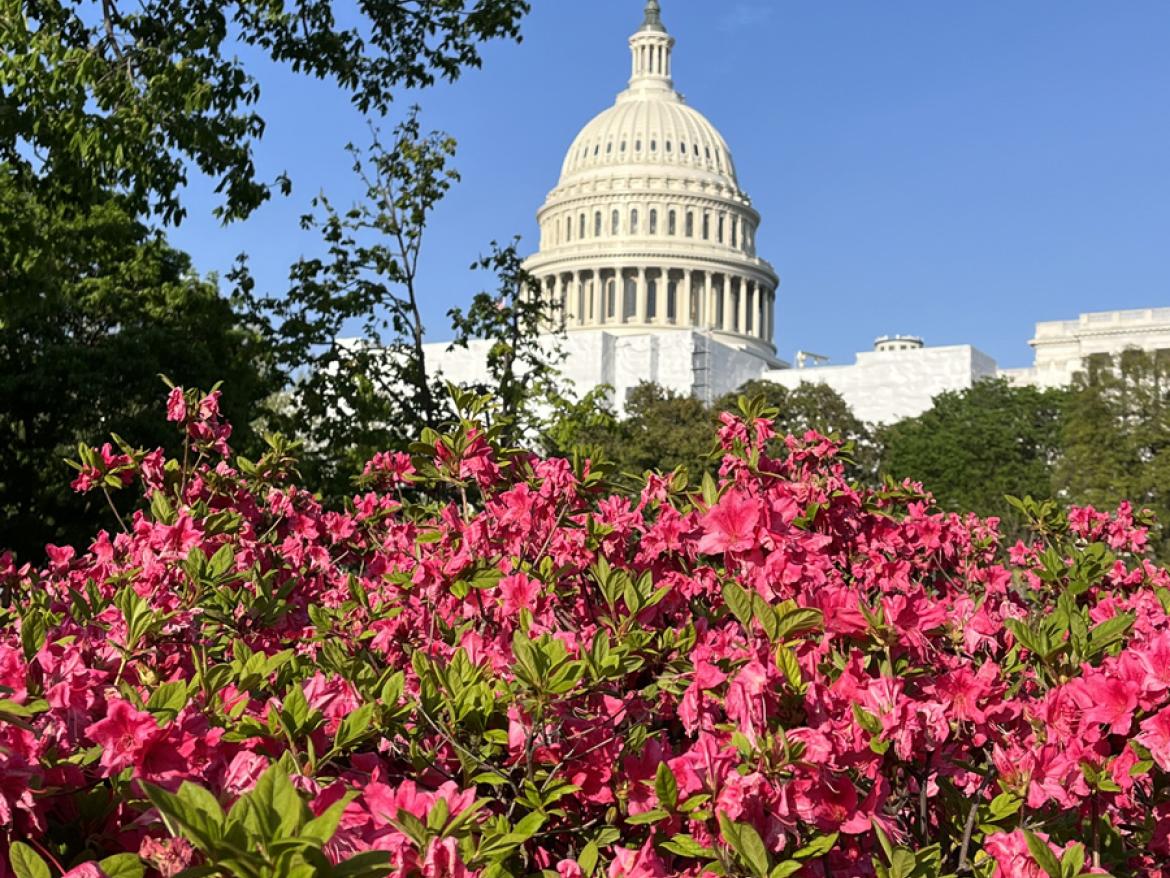As we look toward the next eight decades—or even the next five years—we wonder how to remain brave and constant amid deep partisan divides, ongoing horrors of war, racism, xenophobia, and an environment in crisis.
It is clear that we do not have all the answers. Perhaps we do not need them—yet. Attuning to leadings of Spirit amid today’s chaos requires us to remain open to continuing revelation—but to do so, it first helps to be still.
For us at FCNL, right stewardship has not been about short-term “wins.” We have had to learn to play the long game and be comfortable with the unknown. We have had to learn the difference between “lobbying for” or “speaking on behalf of” an individual or community and witnessing in “solidarity with and alongside” people living the realities of the policies we seek to change.
Our Quaker faith keeps us grounded in this work, but we have not always gotten it right. We have always believed there is that of God in everyone but have had to hone the organizational practice of minding the Light in others. To do this, we often have had to step out of the fray of our work and simply be still.
Being still during some of our most trying times has enabled us to hear, recalibrate, and think deeply, instead of being strictly reactionary. We have learned that we cannot focus our policy work on climate issues around technical fixes, but instead need to start with the experiences of people impacted by climate-induced crises.
We have learned we cannot focus our advocacy for nuclear disarmament only on reducing the number of weapons when there are people already affected by nuclear fallout. Neither can we address the scourge of gun violence at the federal level without first sitting with those working directly in our communities to do the same.
We have had to practice being still as a prerequisite to good stewardship of Friends witness. Being still helps us open ourselves to the ongoing transformation required to do this work in an evolving world.
To live what we profess, we must first confront the role Friends played in harm. Stewardship of Friends’ witness in solidarity with Native and Indigenous peoples requires ongoing reflection and accountability to speak truthfully about our history and open space within ourselves for healing relationships.
We hear a similar call to our work on reparative racial justice. For centuries, Quakers have been at the forefront of movements to abolish slavery, push for civil rights, and promote social justice. Yet, Friends were also complicit in the enslavement of people for decades.
Internally, we are learning how to become an anti-racist community and how our Quaker faith can help us undo our entanglement with white supremacy. This transformation requires us to be still, to listen to the Inward Teacher, to learn from those who have been impacted, and to take new steps each day toward the beloved community we seek.
What we glean during stillness can inspire important change. We have long known that William Penn, the revered Quaker who “founded” the colony of Pennsylvania as a place of religious freedom, was also an enslaver. Until recently, we had not acted to face the complexity of this history and disentangle ourselves from its harm.
When we assumed governance and management of the historic William Penn House, our governors underwent a period of discernment—stillness—about corrective actions to take. In 2021, we renamed the building Friends Place on Capitol Hill. We also started new education and advocacy programs at Friends Place for young adults and all who desire to work for a just, peaceful, and sustainable world.
For FCNL, stewarding Friends witness in Washington is now grounded in our commitment to anti-racism, anti-bias, justice, equity, diversity, and inclusion. As described in our AJEDI Statement, it anchors our work to reorient U.S. policy toward peace and justice. The statement also holds us accountable for carrying out that work with integrity. It helps us be both brave and constant in advocating in a highly partisan Congress and in a politically divided country.
The AJEDI Statement is a living document, as our own understanding of what is required of us to “do justice, love mercy, and walk humbly with our God” (Micah 6:8) also evolves.
Our persistent stewardship toward peace and justice requires repeated periods of stillness. This stillness enables us to listen more deeply and to live into the world of the now and the not yet. It allows us to faithfully persist with both patience and practical action through times of great upheaval and ongoing transformation.
Bridget Moix is general secretary of FCNL.



